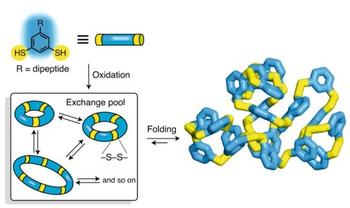Emergence of low-symmetry foldamers from single monomers
Pappas, C.G.; Mandal, P.K.; Liu, B.; Kauffmann, B.; Miao, X; Komáromy, D.; Hoffmann, W.; Manz, C.; Chang, R.; Liu, K.; Pagel, K.; Huc, I.*; Otto, S.* – 2020
Self-assembly is a powerful method to obtain large discrete functional molecular architectures. When using a single building block, self-assembly generally yields symmetrical objects in which all the subunits relate similarly to their neighbours. Here we report the discovery of a family of self-constructing cyclic macromolecules with stable folded conformations of low symmetry, which include some with a prime number (13, 17 and 23) of units, despite being formed from a single component. The formation of these objects amounts to the production of polymers with a perfectly uniform length. Design rules for the spontaneous emergence of such macromolecules include endowing monomers with a strong potential for non-covalent interactions that remain frustrated in competing entropically favoured yet conformationally restrained smaller cycles. The process can also be templated by a guest molecule that itself has an asymmetrical structure, which paves the way to molecular imprinting techniques at the level of single polymer chains.





